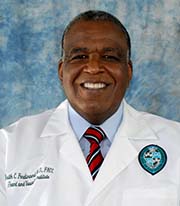Hurricane Katrina 10 Years Later By Keith Ferdinand, MD, FACC, FAHA
ABCs’ Project HOPE (Health Outreach Prevention and Empowerment): A Positive Contribution to the New Orleans Rebirth
On August 29, 2005, Hurricane Katrina devastated the Louisiana-Mississippi coast, bringing 145-mile-per-hour winds, subsequent breaching of the New Orleans levees and flooding of 80% of the City. The extent of death (1,800+) and destruction was unprecedented in the history of the United States. In addition to direct storm-related mortality, injuries and illnesses, another victim was loss of the Crescent City’s medical infrastructure, Very little of the primary or specialty care in the inner city survived.The Kaiser Family Foundation noted that in Orleans Parish, in the two years post-Katrina, one in four adults reported being uninsured, 70% of the uninsured were black, and at least 40% had a diagnosed chronic disease.
Into the breach, in the fall of 2005, stepped ABC’s Project Hope, one of the earliest volunteer efforts to support re-establishing health care delivery, bring aid and awareness to Hurricane Katrina victims and aide those who were still struggling to rebuild their lives.
At that time, as a native of New Orleans whose childhood was nurtured in the Lower Ninth Ward, I was particularly proud of the way ABC committed to support to the rebuilding process. The ABC leadership understood that our organization needed to make a difference. In recognition of our collective values, the ABC staff and membership, led at that time by CEO Waine Kong, MD, President Paul L. Underwood, MD, and Board Chair Jesse McGee, MD, determined how we might assist locals and the city through financial contributions and assistance gathered from members and industry supporters, most prominently from Astra Zeneca Pharmaceuticals, Inc.
Along with cash donations and outreach to displaced citizens, ABC HOPE provided aide to the St Thomas Community Health Center in uptown New Orleans. At St. Thomas, Drs. Mary Abell and Donald Erwin worked with determination to locate and treat patients with undiagnosed and uncontrolled diabetes, hypertension, heart disease and breast cancer. It was the first full service primary care clinic to open post-Katrina. Their patient population included large numbers of patients who were economically disadvantaged and uninsured, which rose dramatically when many people lost their insurance because
their jobs closed. As Dr. Erwin concluded, “Katrina stripped the facade away.”
A shining moment in ABC history, Project HOPE was instrumental in being able to address critical needs by providing medicines, glucometers, blood pressure cuffs and, importantly, making physicians available on a daily basis to assist these patients.
Furthermore, with the $300,000+ HOPE Project funds, ABC was able to provide noninvasive cardiac testing in the community, (a critical service since there were no noninvasive\ studies elsewhere for the uninsured at this time). The HOPE resources made the following possible: echocardiography and adaptors for breast ultrasound; echocardiogram technicians; and cardiology consultations to the clinic. For uninsured patients with little or no other choices, the ABC HOPE provided assets that made a major difference in health outcomes in the early days after the crippling effects of Katrina.
Since Katrina, St. Thomas Community Health Center has continued to grow (now at four locations) and offers quality, affordable care with its team of dedicated internists, pediatricians, psychologists, nurse practitioners and others. http://www.stthomaschc.org/
Unfortunately, ten years post-Katrina, the lingering effects of storm and flooding are real and persistent, but we are all grateful to the support, beyond the financial resources, offered by the ABC and our members.

Note: Dr. Ferdinand is now Professor of Clinical Medicine, Tulane University School of Medicine, having returned to his home in New Orleans. While ABC Chief Science Officer in Atlanta, he directed the ABC HOPE Project and co-published a collection of twenty-seven oral histories of diaspora, Overcoming Katrina: An Africian American Voices from the Crescent City and Beyond, with a foreword by President Jimmy Carter (New York: Palgrave Macmillan, 2009).
